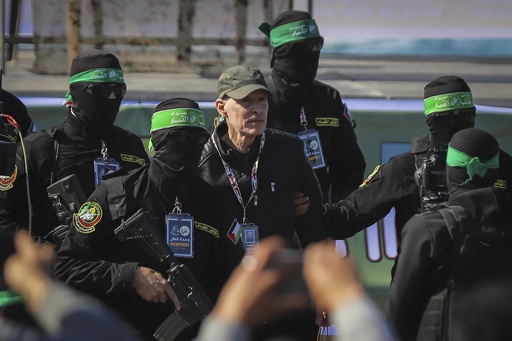Hamas released three hostages from Gaza on Saturday, coinciding with Israel’s release of 183 Palestinian prisoners in a continued series of exchanges amid a ceasefire agreement between the two parties. This ongoing truce, now in its sixth week, outlines the terms for freeing 33 hostages and almost 2,000 Palestinian prisoners, while also facilitating the return of Palestinian citizens to northern Gaza and ramping up humanitarian support for the region.
Next week, discussions are anticipated to begin for a second stage of the ceasefire deal, which aims to secure the release of any remaining hostages and potentially extend the ceasefire indefinitely. Without a resolution, hostilities may resume as early as March.
In a significant move that underscores the progress of the truce agreement, Palestinian health officials announced the reopening of the Rafah border crossing with Egypt on Saturday, enabling thousands of Palestinians in urgent need of medical assistance to cross.
In recent developments, Argentinian officials celebrated the return of Yarden Bibas, an Israeli-Argentine citizen, from Hamas captivity after 16 months. President Javier Milei of Argentina shared several heartfelt videos of Bibas reuniting with his family, highlighting the emotional moments that surrounded his release. Bibas acquired Argentine citizenship by marriage, and his family remains in distress as the status of his wife, Shiri, and their two sons, who were also taken during the initial attack on October 7, 2023, is still uncertain. Although Hamas previously claimed they perished due to an Israeli airstrike, there has been no official confirmation from Israeli authorities.
In contrast, released Palestinian prisoners from Israel recounted their dire experiences in custody, revealing harsh treatment, beatings, and inadequate food supplies. Mohammad Kaskus, who served time for prior militant actions, described frequent abuses during interrogations. Similarly, Murad Hmeidan, serving a life sentence for involvement in violent attacks, expressed concerns about the care and safety of prisoners in Israeli facilities. The Palestinian Prisoners’ Society reported 54 deaths among detainees since Israel’s military operations in response to the October 7 attack, indicating an ongoing investigation into several of these cases by military prosecutors.
Moreover, Arab leaders have jointly rejected proposals by U.S. President Donald Trump, which suggested relocating Palestinians from Gaza to Egypt and Jordan. Following consultations, nations including Egypt, Jordan, and the Palestinian Authority issued a statement affirming their opposition to any plans that would force Palestinians out of their territories.
Images released by the Israeli army depicted Yarden Bibas arriving at a central hospital in Israel and embracing his mother after his release. Bibas returned without his family, who remain unaccounted for in Gaza. Prime Minister Benjamin Netanyahu expressed concern for the wellbeing of Shiri and their children.
Keith Siegel, another recently freed hostage, appeared visibly weakened but declined assistance as he arrived at the hospital, showing resilience after being captured during the October attacks. His family expressed profound relief at his return, while also thanking various governments and organizations for their support throughout his ordeal.
The Israeli Prison Authority verified the release of all 183 Palestinian prisoners earmarked for freedom on Saturday, marking the conclusion of the fourth round of the ongoing prisoner-for-hostage negotiations.
The day also marked the first transfer of ill and injured Palestinian children across the Rafah border into Egypt since it was closed for months, reflecting the progress made in humanitarian efforts following the ceasefire agreement.
Among the released prisoners was Mohammed el-Halabi, a former aid worker whose case garnered significant international scrutiny. El-Halabi’s conviction was met with criticism indicating a lack of fair trial, highlighting broader concerns over the treatment of aid organizations supporting Palestinians in Gaza.
As the ceasefire negotiations unfold, the broader implications of these exchanges and the continued humanitarian crises in Gaza remain a focal point in the ongoing conflict.
